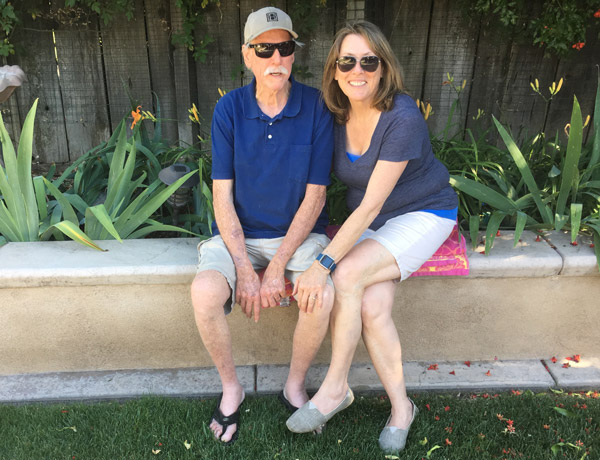Mesothelioma Survivor Finds New Hope with Keytruda
Stories from SurvivorsWritten by Matt Mauney | Edited By Walter Pacheco

Diagnosed with pleural mesothelioma in 2016, Jim Huff went 15 months with no new tumor growth. His only treatment: A twice-daily dose of CBD oil.
When his cancer finally began to progress, spreading to his abdomen, Huff explored other options. Chemotherapy and radiation therapy were still last resorts, and he never was a candidate for surgery.
Fortunately, Huff’s oncologist — Dr. Thierry Jahan at the University of California, San Francisco (UCSF) Medical Center — was able to get Huff on the immunotherapy drug Keytruda (pembrolizumab) without enrolling him in a clinical trial.
“In [Jahan’s] study, he’s testing two different forms of chemo plus Keytruda,” Huff told Asbestos.com. “He knew I didn’t want to do any chemo, and I guess I was too late to enroll in the trial anyway, but he was able to backdoor me in with Keytruda only.”
It appears to be working.
Since starting Keytruda in late February, two CT scans have shown no new tumor growth. He continues to take CBD oil in the morning and evening and THC oil — the psychoactive concentrate — before bed to help with sleep.
“Something is working, a combination or whatever,” the 68-year-old said. “I’m just riding this wave as long as I can.”
No Apprehensions with Keytruda
Huff makes the 65-mile trip to UCSF Medical Center for Keytruda infusions every three weeks. He plans to continue as long as it keeps working.
The only real side effects Huff has experienced from the checkpoint inhibitor is fatigue and what doctors and patients refer to as the “Keytruda rash.”
“I’m a little tired on the day of the treatment and the next day,” he said. “I get a little itchiness from time to time where the rash is, which is mostly on my arms and forehead.”
The rash is constant, but Huff controls it with the CBD oil. Doctors tell him it’s a sign the Keytruda is working.
“I have no apprehensions at all with Keytruda,” he said. “[Jahan] is even more excited about my success with it than I am. He calls me his favorite patient.”
While Huff’s tumors aren’t growing, they also aren’t shrinking.
“No change is fine by me,” he said. “Yeah, I’d love to see them shrink and eventually go away, but if they’re not growing, that’s just about as good for me. It lets me live is what it does. I don’t have to worry about anything. I think I could get another 10 years out of this at least.”

Learn how to access mesothelioma clinical trials utilizing immunotherapy.
Sign Up NowKeytruda Still an Experimental Treatment for Mesothelioma
Keytruda has a 21 to 25 percent long-term survival rate for patients with PD-L1-positive non-small cell lung cancer (NSCLC), according to a statistical analysis of the KEYNOTE-010 and KEYNOTE-001 clinical trials.
The FDA approved Keytruda for NSCLC and several other cancers, not mesothelioma. Most mesothelioma patients get Keytruda through clinical trials or compassionate-use programs.
Huff hasn’t had any issues getting access to Keytruda and counts himself lucky to be in the percentage of patients finding success with it.
Keytruda and similar immunotherapy drugs can cost $150,000 a year. Luckily, Huff’s infusions are covered entirely by Medicare and private insurance.
“Fortunately, I don’t have to worry about that aspect of it,” he said. “It’s a tremendous weight lifted. I don’t feel fortunate that I have mesothelioma, but I feel fortunate that I have all my circumstances.”
Still Playing Guitar and Traveling
Huff doesn’t cough much anymore but does tire easily.
“I don’t know day-to-day how much energy I’m going to have,” he said. “I may get up in the morning and feel like I could run a marathon, or I could be crawling out to the living room. I don’t even know how much energy I’m going to have when I start doing something. Sometimes I get halfway through and realize I’m overdoing it.”
He’s been taking private guitar lessons between doctor appointments but admits he doesn’t practice enough.
“If my parents found out that they were paying for these lessons and I wasn’t practicing enough, they would be very upset,” he said. “I tell my teacher that I bet he has a field day telling his wife that this guy comes in every lesson and doesn’t get any better.”
Yardwork is left to Huff’s wife these days. He tries to do some cooking and chores around the house.
Traveling is limited to day trips and weekend trips by car because Huff refuses to fly without the CBD oil he swears by.
“My wife came up with an idea to take my brother’s trailer and travel some place for a couple of weeks, fly back for the Keytruda appointment and then fly to wherever the trailer is and carry on,” he said. “That would allow me to take the CBD oil before getting on the plane and again after I get back. I think I’m more paranoid about not taking it than getting caught with it.”
And for good reason. Huff had a progression-free survival of 15 months taking only CBD oil. Now he is relying on a combination of the oil and immunotherapy to keep his mesothelioma under control.
“[Jahan] told me whatever I was doing to keep doing it,” he said. “Keytruda, for me, seems to be a wonder drug. It seems to be doing everything it’s supposed to, and I’ll just continue to ride this wave as long as it’s there.”






